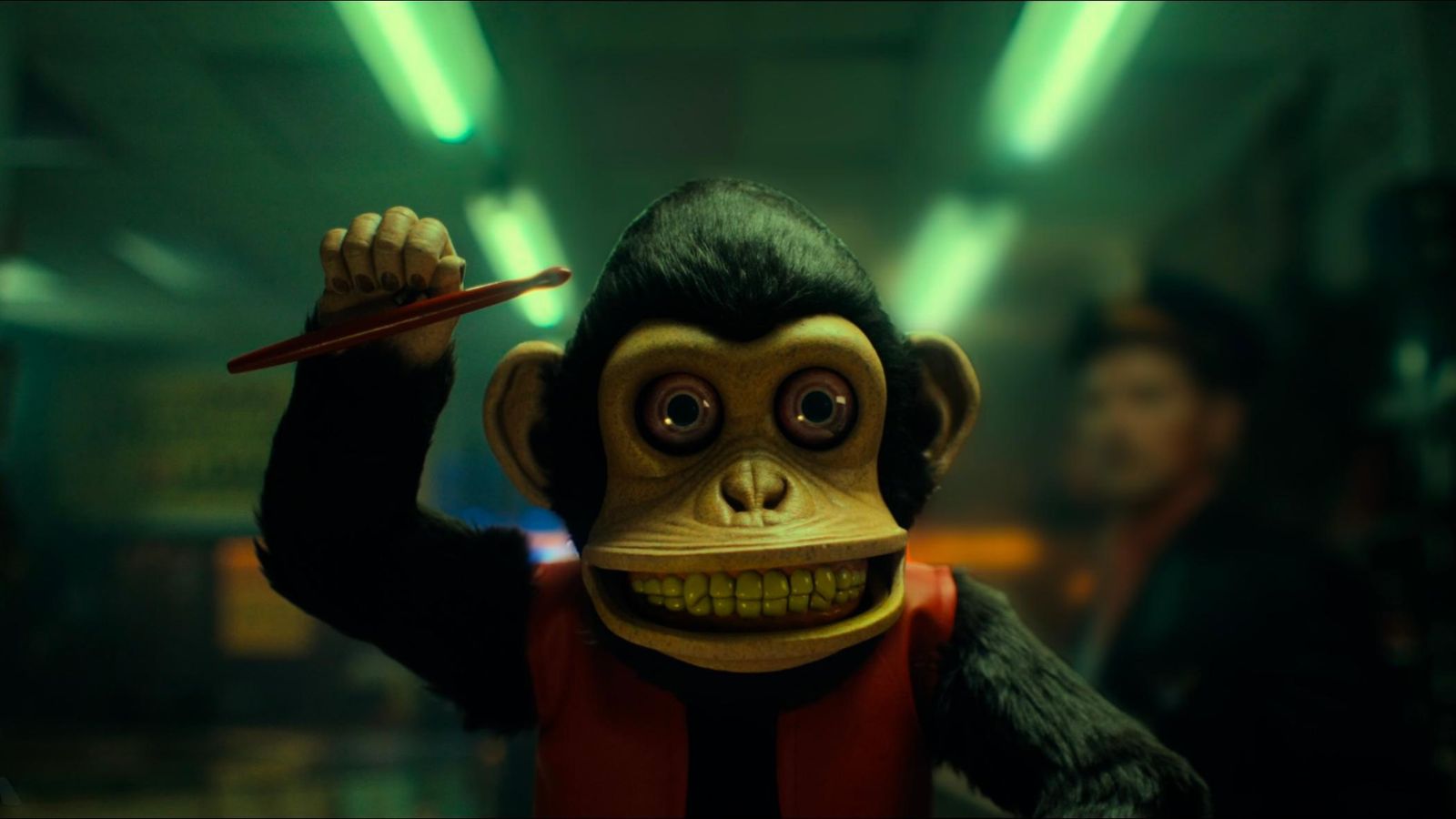
Fresh off of last year’s sleeper horror hit <i>Longlegs</i>, writer/director Osgood Perkins’s quickly returns to the big screen with an adaptation of a short story from legendary author Stephen King. In <i>The Monkey</i>, twin brothers Hal and Bill, played as teenagers by Christian Convery and as adults by Theo James, are dealing with the absence of their father Petey (Adam Scott) while living with their mother Lois (Tatiana Maslany). While going through their father’s things, they a mysterious wind-up toy monkey which they soon discover kills someone whenever it is used. After burying the toy, it suddenly returns 25 years later to begin a new killing spree, forcing the estranged siblings to confront the cursed toy.
The premise of the film is an interesting one and <i>The Monkey</i> certainly delivers when it comes to its horror elements. The audience will be reminded of the classic horror series <i>Final Destination</i> when it comes to the inventive, terrifying accidents that cause the victims of the toy monkey’s bloodlust meet their end. Perkins imagines some horrific and gory kills that aren’t just gnarly to witness, but are the result of a magnificent buildup of tension within the viewer as they’re trained to correlate the monkey’s drum patterns with sudden, impending death for someone onscreen yet to be identified. Waiting for that shoe to drop is part of what makes <i>The Monkey</i> dreadfully engrossing as a horror flick and is the source of its edge of the seat thrills.
<i>The Monkey</i> also aims to provide some substantive commentary on life and family through the life experiences of the Shelbourne brothers. Through their emotional responses to their father’s absenteeism, which serves as the root cause of their lifelong sibling rivalry and ultimately led to many of the toy monkey’s gruesome kills, <i>The Monkey</i> explores generational trauma, forgiveness, and the acceptance of loss. The through-line of paternal abandonment is consistent throughout, even with supporting characters like Rohan Campbell’s Ricky with the monkey as a stand-in for absentee fathers. The Shelbourne brothers, and their father’s, decades long battle with the toy monkey’s murderous ways which have cause both generations of Shelbourne men to neglect their families and connections with the outside world serve as a metaphorical depiction of the cycle of generational trauma which often takes mindful, years-long work to overcome. As the film rolls along, Hal recognizes this toxic pattern he has inherited and now drives with his own son Petey which must ultimately face and rectify. <i>The Monkey</i> posits that loss, whether it be through someone’s choices or untimely death, is sure to result in pain but is also unavoidable, and thus, must be accepted and dealt with in a way that doesn’t cause the grieving to destroy what’s left of their lives. It’s an emotional theme with the potential to be highly resonant, which makes <i>The Monkey’s</i> other tonal choices that undercut it all the more baffling.
If viewers come into this film expecting straight horror, they may be in for a surprise as <i>The Monkey</i> is almost just as much a comedy as it is a scary movie. The dry humor and punchlines are even more plentiful than the gore, but the comedy is so consistent and overpowering that it throws off the tonal balance of the film almost entirely. It distracts from the film in a way that you can feel during its runtime and undercuts the potential of its theme and horror setting by taking away time that could’ve been spent adding to its depth or upping the thrilling moments for the audience. Instead, that time is spent making jokes that may push away some viewers who were looking for more straightforward horror.
It’s this element that ultimately makes <i>The Monkey</i> feel more like an opportunity lost, a promising concept that left more on the table that brought forth. The performances from Theo James and Christian Convery as adult and teenage Hal and Bill respectively are serviceable, but much like the film itself, have even greater potential that perhaps would’ve been better served in a film that depended less on its comedic chops and instead aimed for something more deadly and/or serious. Colin O’Brien performs similarly as Petey, but the theme surrounding strained paternal relationships isn’t fleshed out enough for his chemistry with James to blossom. For those who connect with <i>The Monkey’s</i> humor, this film may connect more deeply. But those looking for horror thrills may leave disappointed.
Image: NEON

